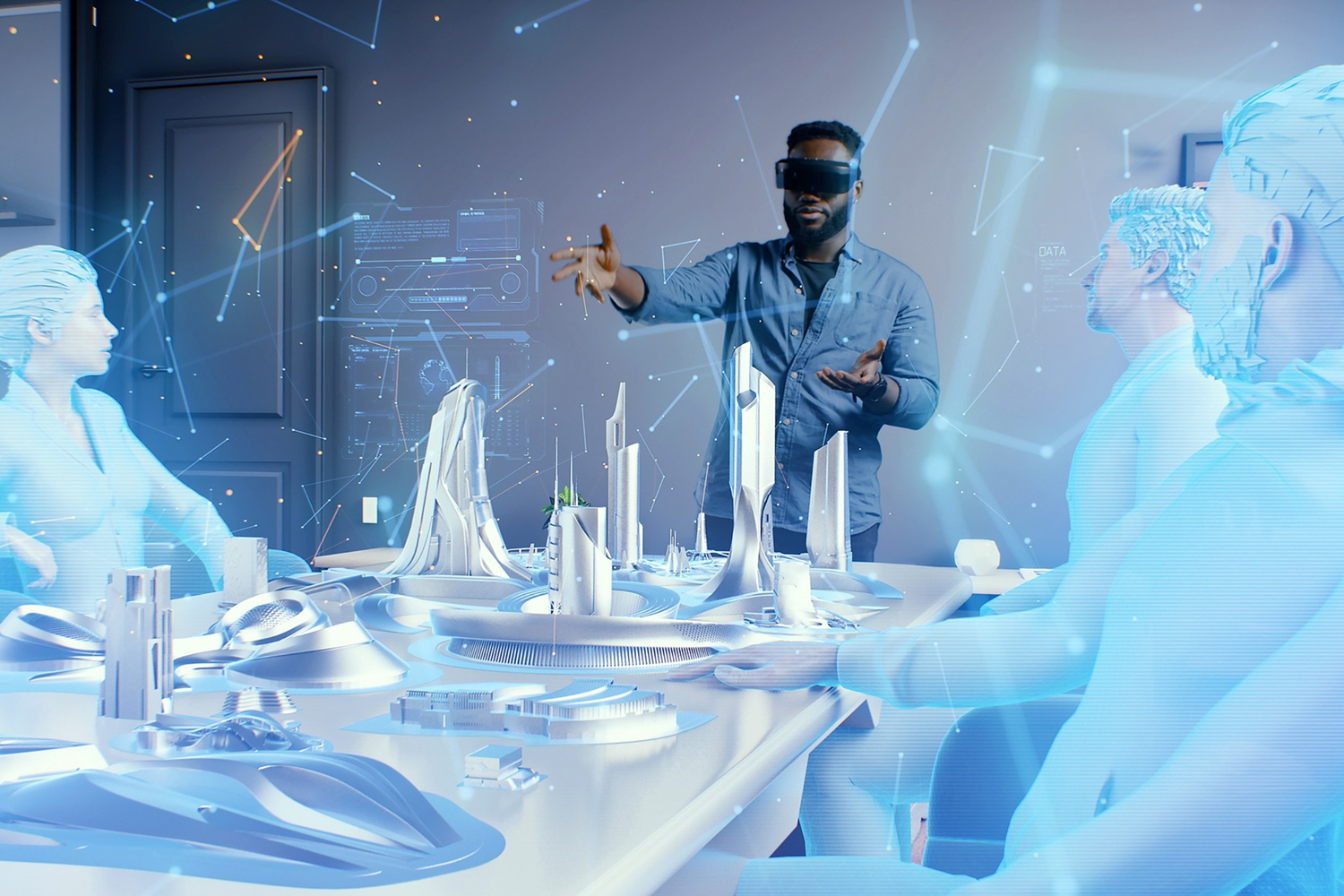The new metaverse reality is climbing up the tide of Web3 and bringing into life concepts that have previously existed exclusively on paper. One of them is metaverse training, a phenomenon that’s about to change humanity's approach to education and learning. Today the media is replete with a spectrum of opportunities that offers the metaverse for training.
As a technology fostered by AI, ML, blockchain, cryptocurrency, and XR solutions, the metaverse opens new prospects for e-learning in such areas as healthcare, fitness, manufacturing, military, and education. According to PwC forecasts, VR and AR software will influence about 23m jobs in the world, indicating the need to shift to metaverse training.
In order to take advantage of this concept, you’ll require a responsive, user-friendly, and smoothly performing software supporting this type of e-learning. That’s why you may deem it necessary to refer to a metaverse development company and get a viable solution for your future training program. Read on to get more insight into how to use your metaverse!
What Is the Metaverse?
The metaverse is a term that has been gaining significant traction in recent years, capturing the attention of technology enthusiasts, educators, and businesses. But what exactly is the metaverse, and how can it transform the way we learn and work? Here's where we delve into the concept of the metaverse and its potential applications for VR workplace training and development. Ready? Let's get started and break our answer into smaller bits of information!
The metaverse: A virtual universe
According to our extensive experience and technological insight, the metaverse implies a unified digital realm that emerges from the fusion of augmented physical reality with enduring virtual environments, forming a communal virtual space for shared experiences. In simpler terms, it's a digital universe that seamlessly integrates with our real-world experiences. In the metaverse, users can explore and inhabit vibrant digital landscapes, forming connections and interacting with virtual elements and fellow participants in a manner that mirrors real-world experiences.
Metaverse training: A new era of learning

One of the most promising applications of the metaverse is in the field of training and development. Ranging from professional development to scholarly pursuits, the metaverse holds the capacity to transform our methods of acquiring knowledge and skills in unprecedented ways. After testing this technology in practice, we've distinguished some key benefits that metaverse training can bring:
Immersive learning experiences. Metaverse training courses can create highly engaging and interactive learning experiences beyond traditional classroom settings. The immersive nature of the metaverse helps learners develop a deeper understanding of concepts by allowing them to visualize and interact with the subject matter.
Collaborative learning. Training in the metaverse enables learners to work together in real-time, irrespective of their geographical location. Such an environment nurtures a feeling of unity and encourages cooperative approaches to addressing challenges.
Customizable learning environments. Metaverse training courses can be tailored to suit the specific needs and learning styles of individual learners. Consequently, learners benefit from a tailored and effective educational journey.
Real-time feedback and analytics. Metaverse workshops can track learners' progress and provide immediate feedback on their performance. This data-driven approach can help identify areas for improvement and guide future learning interventions.
Benefits of Training in the Metaverse
Employee training is one of the most rapidly changing areas in the IT industry. The more innovative technologies are implemented, the broader learning prospects are required. Adaptability, user-friendliness, and the quick onboarding potential account for the primary pillars upholding up-to-date training software. The new-gen software solutions like the Unity metaverse and Unreal currently offer even more immersive training capabilities.
Primarily, the industry requires staff to be swiftly prepared for the job because time is money. And that’s exactly where metaverse training steps in, promising the most valuable benefits for both employers and employees. As research indicates, workers trained in the VR/AR environment learn 4 times faster as opposed to the conventional classroom setting.
Aside from the swiftness, this type of e-learning offers a wide range of advantages for employers to consider while changing their approach to training personnel. Overall, both in theory and practice, the pivotal benefits of training in the metaverse include:
- Speed. As already mentioned, employees learn far faster while training with the help of immersive technologies as compared to traditional means.
- Convenience. If employers opt for metaverse training, they won’t need to arrange the workspace and physical environment to meet all the safety standards as well as facilitate faster learning, inasmuch as everything is happening virtually.
- Stress & risk reduction. Not only does remote access reduce the exposure to stress or risks as employees learn but also it positively affects the acquisition of new skills and their quicker mastering in practice.
- Cost-efficiency. By implementing metaverse training solutions, employers save time as well as human and financial resources because there’s no need to spend them on employee transfer, office rearrangement, or other preparations.
- Improved practicality & performance. In addition to facilitating faster onboarding, metaverse training options allow trainees to acquire hands-on job experience in a risk-free setting that allows for better practicality and performance as they learn to solve issues in real-world scenarios.
The benefits of metaverse training, including speed, convenience, stress, risk reduction, cost-efficiency, and improved practicality and performance, make it a highly effective tool for employee training and development. The metaverse's immersive learning capabilities provide learners with personalized learning experiences that cater to their unique training requirements, which can significantly enhance the learning experience for employees.
Moreover, metaverse training is highly cost-efficient, saving time, human resources, and financial resources since there's no need to spend them on employee transfer, office rearrangement, or other preparations. This makes it an attractive option for employers looking to provide their staff with adequate training solutions that are both cost-effective and efficient.
In conclusion, metaverse training is rapidly gaining popularity in the IT industry, and it's essential to stay informed about the latest technologies and trends to take full advantage of this transformative tool. With the potential to significantly enhance the employee learning experience, metaverse training is a must-have tool for any organization looking to stay competitive in the current digital age.

What Technologies are Used to Build the Metaverse?
The metaverse is a rapidly emerging concept that promises to revolutionize various industries, including virtual reality emergency training and e-learning. At its core, the metaverse is a virtual shared space, combining virtually enhanced physical reality with persistently simulated virtual environments. In order to create this immersive and interactive digital realm, several cutting-edge technologies are utilized. This article explores the key technologies driving the metaverse and their potential impact on training and learning.
Core technologies behind the metaverse
Gaining insight into the metaverse's technological foundations requires a comprehensive understanding of the pivotal technologies that fuel its development:
Virtual reality (VR). Virtual Reality is the cornerstone of the metaverse experience. VR allows users to immerse themselves in computer-generated environments, interacting with digital objects as if they were in the physical world. The use of VR headsets and controllers enables a genuinely immersive experience, making it a perfect fit for metaverse training courses and workshops.
Augmented reality (AR). AR technology overlays digital information onto the user's real-world view, enhancing their perception of reality. In the metaverse, AR can be employed to provide contextual information, create interactive learning experiences, and enable seamless collaboration between learners.
Spatial computing. Spatial computing allows digital objects to exist in three-dimensional space, enabling users to interact as they would with physical objects. This technology is essential for creating immersive metaverse environments, promoting realistic simulations, and enhancing the overall user experience.
Blockchain and decentralized networks. Decentralization and blockchain technology play a significant role in the development of the metaverse. Blockchain allows for secure digital asset management, creating trust and transparency within the metaverse ecosystem. Decentralized networks ensure that the metaverse remains accessible and resistant to censorship.
Artificial intelligence (AI). AI and machine learning algorithms can be employed in the metaverse to create personalized learning experiences, simulate realistic scenarios, and provide real-time feedback to learners.
5G and edge computing. The metaverse demands low-latency, high-bandwidth networks to provide seamless user experiences. 5G and edge computing technologies are crucial to achieving this, as they enable rapid data processing and facilitate real-time interactions between users.
Metaverse training: Harnessing emerging technologies
The convergence of these technologies has opened up exciting possibilities for metaverse training and learning. By leveraging these advancements, metaverse training courses, and workshops can offer unique benefits to learners:
Immersive learning
The combination of VR and spatial computing creates incredibly immersive learning environments. Metaverse training allows learners to fully engage with the content, resulting in a deeper understanding of the subject matter.
Real-time collaboration
AR and 5G technologies enable real-time collaboration between learners, irrespective of their physical location. Training in the metaverse fosters a sense of community and promotes collaborative problem-solving.
Personalized learning
AI-driven personalization allows metaverse training courses tailored to individual learners' needs and preferences. This results in more effective and efficient learning experiences.
Gamification
The metaverse's inherent interactivity and immersive nature lend themselves to the incorporation of gamification elements. Gamification can boost learner motivation and engagement, making training more enjoyable and productive.
The future of metaverse training: Challenges and opportunities
The ongoing evolution of the metaverse will give rise to fresh opportunities and challenges in the realm of training and learning. Here are some critical considerations for the future of metaverse training:
Accessibility and inclusivity. Ensuring that metaverse training courses and workshops are accessible to a diverse range of learners, regardless of their technical proficiency or physical abilities, will be crucial to the widespread adoption of metaverse training. As virtual reality (VR) and augmented reality (AR) hardware costs decrease, metaverse training courses and workshops will become more accessible to a broader audience.
Integration with artificial intelligence (AI). AI-powered virtual instructors and personalized learning paths can elevate the metaverse training experience to new heights.
Standardization and interoperability. As the metaverse ecosystem expands, developing standardized protocols and interoperability between different platforms will be essential for seamless user experiences. The development of standardized metaverse development courses and certification programs will ensure that metaverse training meets the highest quality standards.
Privacy and security. Protecting user data and ensuring privacy within the metaverse is a top priority. Implementing robust security measures and promoting digital literacy among users will be vital to maintaining trust and safety.
Ethical considerations. The development and use of metaverse training technologies raise ethical questions, such as the potential for bias in AI algorithms and the impact on employment. Addressing these concerns through responsible innovation and stakeholder engagement will be key to the metaverse's long-term success.
The metaverse offers a world of possibilities for the future of training and learning. From engaging educational encounters to instantaneous teamwork, metaverse training can radically alter how we attain fresh expertise and understanding. With the progress of technology, an increasing number of sectors will likely adopt the metaverse for workforce education and professional growth. With the advent of metaverse training courses and workshops, the future of learning is undoubtedly bright and full of promise.
Embracing the metaverse for training and development not only opens up new avenues for personal and professional growth but also equips individuals with the necessary skills to thrive in an increasingly digital world. As more organizations recognize the value of metaverse training, we can expect a surge in the development of innovative metaverse training courses, workshops, and solutions tailored to meet the diverse needs of learners.
Delving further into the possibilities of the metaverse requires keeping abreast of the most recent developments and trends in the domain. By enrolling in metaverse development programs and connecting with professional communities centered on metaverse education, individuals and organizations can maintain a competitive edge and harness the boundless potential of this groundbreaking innovation.
Thus, the metaverse is a powerful tool that can reshape the training and development landscape, offering immersive, interactive, and personalized learning experiences. As we venture further into the digital realm, the metaverse will undoubtedly play a pivotal role in the evolution of learning, shaping the future of education and professional development for years to come.
Program-Ace Created the Training MR Experience Metaverse Platform

Having leveraged all of our potentials, we created a platform on which anyone could make spatial training apps without coding a thing. As a cloud-based virtual reality environment, it provides the entire tech stack for you to breathe life into your ideas.
Software used to create metaverses
The creation of metaverses relies on an array of software tools and platforms, enabling developers to build immersive and interactive virtual worlds. These tools and platforms are instrumental in shaping metaverse training courses and workshops, catering to various industries and learning needs. Below are some of the notable software solutions and platforms used in the development of metaverse environments:
Unreal Engine. Developed by Epic Games, Unreal Engine is a powerful game engine widely used for creating realistic and immersive 3D virtual worlds. Its high-quality graphics, physics simulations, and scripting capabilities make it ideal for developing metaverse training courses, offering learners an engaging and interactive experience.
Unity. Unity is another popular game engine that has gained traction in the metaverse development. Its versatile and user-friendly features enable developers to create visually stunning and interactive metaverse environments suitable for various training purposes.
WebXR. WebXR is an open standard that enables the development of VR and AR experiences on the web. It allows for the creation of accessible and platform-agnostic metaverse training courses, which can be accessed directly through web browsers without the need for additional software or hardware.
SpatialOS. Developed by Improbable, SpatialOS is a cloud-based platform designed to create large-scale, persistent virtual worlds. It enables developers to build and manage metaverse environments with millions of entities and users, providing the infrastructure for large-scale metaverse training programs.
A-Frame. A-Frame is an open-source web framework that simplifies the creation of VR and AR experiences. It provides an accessible entry point for developers looking to create metaverse training courses and workshops, offering various tools and resources for creating engaging virtual environments.
Blender. Blender is a free and open-source 3D creation suite used for modeling, animation, rendering, and simulation. It is often used in conjunction with other game engines, such as Unity or Unreal Engine, to create assets and environments for metaverse training courses.
Keeping pace with the metaverse's expansion and evolution, it’s imperative that developers and organizations remain abreast of the most recent software and platforms utilized in metaverse development. By participating in metaverse development courses and engaging in professional networks focused on metaverse training, individuals and organizations can stay ahead of the curve and unlock the full potential of this transformative technology.
The integration of these software tools and platforms is fundamental in creating metaverse training courses and workshops that cater to the diverse needs of learners across various industries. Through the effective use of these state-of-the-art technologies, metaverse training has the potential to deliver unmatched educational encounters, promoting teamwork, customization, and absorption across various industries.
As our conclusions show, the metaverse represents a significant opportunity for transforming the world of training and learning. The use of specific software solutions and platforms in the development of metaverse environments enables the creation of immersive and interactive virtual worlds that enhance the learning experience.
Metaverse for Training: Use Cases
AR/VR training suites already help thousands of organizations worldwide to bring their onboarding processes to the next level. Interestingly, these entities are of various scale and operation fields. For instance, the International Committee of the Red Cross (ICRC) delegated the responsibility of training employees to a VR helmet already in 2019.
While some still curiously type into Google “what is the metaverse”, others are already using the technology to their own ends. Moreover, the diversity of industries gaining a competitive edge in training with immersive solutions is impressive. Beginning with healthcare as well as ending with education and military, metaverse training options are gradually expanding.
Healthcare: Metaverse medical training
The potential applications of the metaverse in employee training and development are vast, and one of the most valuable areas is medical personnel training. Immersive technologies in the metaverse allow young healthcare practitioners to gain practical experience without ever leaving their rooms. Whether it's a complex surgical procedure or first aid, medical staff can apply theory in practice while remaining in a risk-free environment.
Metaverse training is not limited to just medical procedures; it can also be used to provide mental health assistance to patients as per the latest telemedicine trends. XR technology's remote access not only allows practitioners to receive training in a safe and sometimes even enjoyable atmosphere but also to apply the acquired knowledge during counseling sessions with real patients.
Overall, metaverse for training has immense potential in the healthcare industry, providing a safe, risk-free environment for healthcare practitioners to acquire practical experience and apply their knowledge to real-world scenarios. As healthcare is a field that requires continuous learning and development, metaverse training can help healthcare practitioners stay up-to-date with the latest medical procedures and best practices, ensuring that they provide the best possible care to their patients.
Fitness: Metaverse personal trainer
Just like the metaverse is already used in the event industry, some of its e-learning capabilities are also frequently applied in the fitness and wellness industry. For example, even though metaverse personal trainers are still under development, there are already some apps equipped with virtual and augmented reality to help users get in shape.
Les Mills Bodycombat is a unique software that allows its users to combine gaming with a VR helmet on and fitness exercises, which marks the beginning of a new era in the industry. With metaverse personal trainers, users will be able to work out in entertaining environments no matter where their actual whereabouts are.
Manufacturing: Metaverse job training
The metaverse presents a captivating way to work out, but its potential goes beyond fitness. The immersive technology can also be utilized in metaverse job training, especially for industries such as manufacturing, where the onboarding process for inexperienced workers can entail significant risks and hazards. Training personnel in a safe virtual world can minimize potential risks and dangers in the real world.
Industrial enterprises require their employees to possess sufficient experience and practical skills to reduce related risks, ranging from biohazards to other dangers. Inexperienced employees pose a threat not only to themselves but also to the environment and their colleagues as they perform their duties. Therefore, metaverse for training can provide a safe environment for employees to learn and develop their skills.
Metaverse training can also offer other benefits, such as cost and time efficiency, compared to traditional training methods. The technology allows for customized training programs, enabling learners to receive personalized training that caters to their specific needs. The interactive nature of metaverse training also fosters collaboration and enhances the learning experience, promoting better knowledge retention.
The metaverse provides a unique and effective solution for job training in industries that entail risks and hazards. By utilizing metaverse training, inexperienced employees can learn and develop their skills in a safe and immersive environment, reducing potential risks in the real world. The technology offers numerous benefits, including cost and time efficiency, customization, and interactivity, making it an attractive alternative to traditional training methods.
Armed forces: Metaverse military training
Military institutions may also derive great value from utilizing metaverse training solutions. Just like the training programs of workers at industrial facilities, soldiers’ ones often involve direct physical risks that can be quickly minimized with the help of immersive technology. Relocating their training to a metaverse, soldiers will practice skills without risking their lives.
In addition, such training experience is able to provide soldiers with more stress resistance by preparing their mental state to dangerous military conditions. Metaverse training can be especially relevant and helpful for people suffering from PTSD. Referring to virtual reality exposure therapy, practitioners simulate dangerous scenarios in safe circumstances.
Education: Metaverse teaching
Hands-on metaverse training can also be of importance whenever it comes to schooling and higher education. Despite a specialty, VR headsets are likely to become the new normal in the disciplines requiring practical knowledge. 66% of XR technology experts agree that immersive teaching experiences will occupy a special place in the curriculum of the future.
Thanks to metaverse teaching platforms expected to emerge in the years to come, students will be able to master all the subjects through practice directly from their homes. Therefore, XR solutions in the education discourse are of utmost significance to ensure studying in secure and entertaining environments.
The Future of the Metaverse Training Market
Virtual training software isn’t yet ubiquitous, and not all companies refer to this solution because newcomers first need to enter the metaverse, which, in turn, has to be developed. Although this initiative takes time to be implemented, metaverse development already deserves a separate place in the global market of IT services. What the COVID-19 outbreak showed the world was an unprecedented drop in the global economy due to disruptive shifts in the work of companies and supply chains.
That’s why the IT industry will continue to elaborate on new prospects for metaverse training. According to forecasts, the global metaverse market size is likely to approximate $800bn by 2024. Isn’t it a prediction worthy of investment? Well, venture capitalists around the globe continue to inflate the metaverse bubble. Ultimately, XR technologies, blockchain, gamification, cryptocurrency, metaverse, and other innovative market solutions are projected to pave the way for Web3, opening new prospects for e-learning.
The potential of the metaverse for employee training is enormous, and its application in various industries is becoming increasingly popular. With the market projected to grow to $800 billion by 2024, it is clear that the investment in metaverse training is worthwhile. Here are some of the ways that the metaverse can revolutionize job training:
Customizable learning experiences. Metaverse training offers unparalleled opportunities for creating custom, immersive learning experiences that cater to the needs of different learners. With the ability to simulate various scenarios and environments, employees can gain hands-on experience without risking their safety or the safety of others.
Remote training. One of the biggest advantages of metaverse training is the ability to conduct training remotely, eliminating the need for physical space and equipment, as well as making it a cost-effective solution for businesses of all sizes.
Interactive learning. Metaverse training allows for interactive learning experiences that engage learners and provide them with immediate feedback, increasing knowledge retention and improving overall performance.
Gamification. Incorporating gamification elements in metaverse training can make learning more enjoyable and engaging, leading to better outcomes. Gamification can also increase motivation and promote healthy competition among employees.
Blockchain-based certification. With the rise of blockchain technology, it is now possible to issue verifiable and tamper-proof digital credentials. By leveraging the potential of the metaverse, employee training can be transformed into a more reliable and transparent process for certifying skill sets.
The metaverse is rapidly evolving, and the potential applications for training and learning are only just being explored. As more industries adopt metaverse training, we expect to see a significant shift in how we approach education and job training. Whether it's in healthcare, manufacturing, or any other industry, metaverse training can revolutionize how we acquire new skills and knowledge.
Leverage Program-Ace Services to Grasp the Metaverse
To squeeze the most out of the metaverse concept until it’s hot, you’ll need a solid digital platform where all other services will be integrated in the future. Metaverse development agencies continue to realize new ideas and give them new meanings from project to project. Program-Ace is one of them, whose reliable team can build your metaverse from scratch.
What you can do to become one step closer to getting your own virtual world is just contact us, and we’ll be able to discuss partnership conditions that will exceed your expectations!












